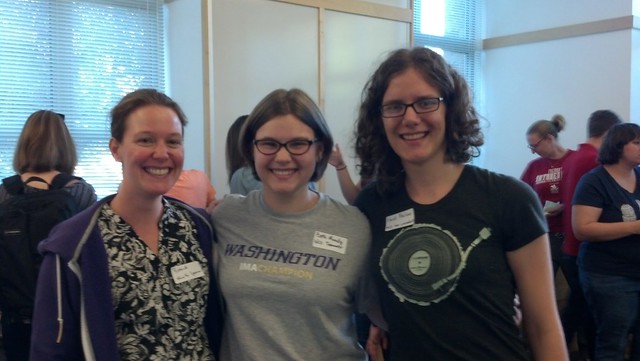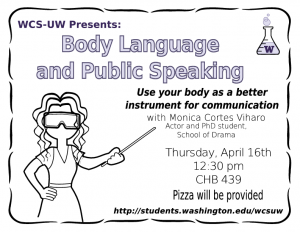Yesterday, WCS and Women in Genome Sciences hosted a discussion with Professor Sapna Cheryan of the UW Department of Psychology. This event left me with a lot to think about, and was definitely worth the trek over to Foege Hall!
We talk a lot about underrepresentation of women in STEM fields, but this is a broad and complicated topic. Looking at the demographics of students taking AP exams and getting undergraduate degrees in different STEM disciplines, some fields (biology, chemistry, and math) are now close to 50% female at this level, while others (physics, computer science, engineering) have a much more significant disparity. By looking at differences among these fields, Professor Cheryan hopes to untangle and understand different causes of women’s underrepresentation in STEM. She emphasized that she investigates different aspects of STEM fields rather than focusing on qualities of the women who enter or leave these fields, which I thought was an important and beneficial distinction to make.
Professor Cheryan and her group just finished a large-scale review of studies on gender and STEM, focusing on the STEM participation of students in the US and seeking to find which factors have the biggest impact. They considered a variety of individual (early hands-on experience, self-efficacy, math performance) and societal (stereotypes of the field, negative stereotypes of women, presence of female role models, discrimination) factors that have been cited for the lack of women in these fields. Their conclusions were that the difference in demographics between bio/chem/math and physics/engineering/computer science is primarily due to two factors: the gender imbalance in early hands-on experience (toys, projects, classes, media), and women’s perception of the field or how they relate to it.
Before this review, Professor Cheryan’s research has mostly focused on women in computer science. In one study, non-CS-major undergraduates were brought to Stanford’s computer science building and given a questionnaire on their interest in the subject. Some of the students were in a room containing several stereotypically CS-related items (Star Trek poster, sci-fi books, lots of Coke cans) while others were in a more generically decorated room. While male students demonstrated the same level of interest in computer science regardless of the room decor, female students were substantially less interested when they were in the stereotypical computer science room. Emphasizing the stereotypes influenced their perception of the field, which affected their interest (this reminded me of our discussion of Whistling Vivaldi in last summer’s book club – stereotypes can be really powerful!).
There are a variety of stereotypes related to computer science that can turn off women’s interest in the field. The stereotypical programmer is socially awkward, stays up all night coding and drinking energy drinks, and is into video games and Star Trek. Success in computer science is perceived to be related to innate genius or brilliance, rather than hard work (a recent Science paper explored this effect among different fields). And it’s not seen as a people-oriented area – computer scientists don’t work with people, and their work isn’t focused on helping society. (I realized that this last point played a role in my decision not to major in computer science. It was challenging and interesting, but I wanted to make an impact on the world with renewable energy or biomedical science.) However, computer science stereotypes can vary a lot across cultures – in some countries, typing code on a computer is seen as a logical extension of being a secretary, a traditionally female job; these countries are generally much closer to gender parity in computer science.
Fortunately, there are many other ways to counter these stereotypes and make STEM fields more welcoming. A twelve-year-old girl recently surveyed a set of popular apps and found that most of them offered male characters as the default or only option. This creates the impression that these games (and the industry that creates them) are not for girls, but it would be easy for developers to offer more female characters in games. At the undergraduate level, some colleges and universities are redesigning their computer science curricula (Harvey Mudd is the most prominent example) and creating more open-ended or interdisciplinary majors to emphasize the different applications of computer science, encouraging students to move beyond their existing perception of the topic.
In our discussion of ways to encourage girls to get into computer science, Professor Cheryan also pointed out how some of these methods tend to enforce the same stereotypes that prevent many girls from developing an interest in the field. Many people and programs emphasize that girls can be nerds too (Microsoft runs camps for girls where they learn about CS in relation to sci-fi movies and video games) or that you can be a nerd while still being feminine (computer engineer Barbie has pink glasses, a binary t-shirt, and a pink laptop). But maybe we’d be better off teaching girls that not all computer scientists are nerds. This reminded me of the Seattle Expanding Your Horizons conference, where some of us told our audience of middle-school girls that you don’t have to be a nerd to do science, while others wanted to emphasize that being a nerd is awesome and nothing to be ashamed of. When trying to make STEM fields more diverse, we need to think not only in terms of gender and demographics but also in terms of personalities, interests, and perspectives. This is definitely something I’ll try to be aware of in the future when doing outreach and talking to the public.


